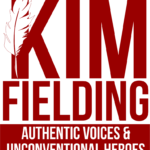When people talk about what it takes to be a good author, they generally focus on the technical aspects. Good authors need fluency with vocabulary, an ear for natural dialogue, a strong sense of pace, an ability to show setting and character through evocative details rather than by throwing them in the reader’s face. But one aspect of good writing that’s often overlooked is emotion. In order to be an effective author—especially of romance!—the writer must be able to tap into emotions so genuinely and deeply that the reader will feel them too. In my case, and I suspect most authors’ cases, that means that while we’re writing, we have to experience those emotions ourselves.
Sometimes this is an easy thing to accomplish. When I’m immersed in a story—especially as I near the end—I empathize with my characters. This can be painful, of course, if they’re going through something difficult. I’ve written a few scenes that completely tore me up, such as a particular part of The Tin Box (if you’ve read it, you know what I mean) and an early scene with Jack in Motel. Pool.
But sometimes life outside of my stories is rough. Turmoil can come from all sorts of places: family, friends, the day job, aspects of the writing profession, the general state of the world. When that happens, I think a lot of us have a really hard time getting the words down. Not just because it’s hard to concentrate or feel motivated, but also because our personal emotional life is taking up so much space that it’s difficult to let our characters in.
When this happens to me, I have a few strategies I try:
- Write really angsty stuff. If I’m feeling worried or sad or stressed or miserable in general, why not write characters who are feeling the same way? Not only can I connect with them easily, but the writing process becomes therapy. It can help put my own issues in perspective; yes, I may have to deal with a difficult person at work, but at least I’m not a one-handed giant falling in love with the prisoner I’m supposed to be keeping an eye on. I eventually solve my characters’ problems, giving them their hard-won HEA, which helps me feel like I have some agency to solve my own.
- Read an excellent book. When I read someone else’s well-crafted work, I temporarily set aside my real world to fall into theirs. This can inspire me to write and also help me compartmentalize my inner turmoil, reminding me that there’s more to life than whatever’s currently dragging me down.
- Write something silly. For those who write professionally, there can be pressure to pen stories that readers will love, stories that are deep, or stories that sell well. And that’s fine. But there’s nothing wrong with playing too—fooling around with words just for the pleasure of it, without ever intending for anyone else to see those words. It’s the literary equivalent of sitting down and eating a pint of Ben & Jerry’s.
- Talk to fellow authors. Friends and family can offer tons of support, but I find that sometimes other authors best feel my pain and give me exactly the boost I need right then. This can make me feel excited about my work again. If I can afford the time and money, attending a writing conference is also wonderful, not so much for specific skills I’ll learn as for the general atmosphere of encouragement.
- Take a break from writing. Writing is hard work, and there’s no shame in resting now and then. I usually force myself to sit down at the keyboard and type, regardless of whether I’m in the mood. But now and then I ease up on myself. It’s like exercise: a runner might keep on jogging through mild fatigue or a mild cramp, but would stop and heal if they tore a meniscus. You have to do what’s healthy for you.
Whether you’re an author or not, what are your methods of working through rough times?
***
 Kim Fielding is the bestselling author of numerous m/m romance novels, novellas, and short stories. Like Kim herself, her work is eclectic, spanning genres such as contemporary, fantasy, paranormal, and historical. Her stories are set in alternate worlds, in 15th century Bosnia, in modern-day Oregon. Her heroes are hipster architect werewolves, housekeepers, maimed giants, and conflicted graduate students. They’re usually flawed, they often encounter terrible obstacles, but they always find love.
Kim Fielding is the bestselling author of numerous m/m romance novels, novellas, and short stories. Like Kim herself, her work is eclectic, spanning genres such as contemporary, fantasy, paranormal, and historical. Her stories are set in alternate worlds, in 15th century Bosnia, in modern-day Oregon. Her heroes are hipster architect werewolves, housekeepers, maimed giants, and conflicted graduate students. They’re usually flawed, they often encounter terrible obstacles, but they always find love.
After having migrated back and forth across the western two-thirds of the United States, Kim calls the boring part of California home. She lives there with her family and her day job as a university professor, but escapes as often as possible via car, train, plane, or boat. This may explain why her characters often seem to be in transit as well. She dreams of traveling and writing full-time.
Follow Kim:
Website: http://www.kfieldingwrites.com/
Facebook: http://facebook.com/KFieldingWrites
Twitter: @KFieldingWrites
Email: Kim@KFieldingWrites.com
Newsletter: http://eepurl.com/bau3S9
A complete list of Kim’s books: http://www.kfieldingwrites.com/kim-fieldings-books/

